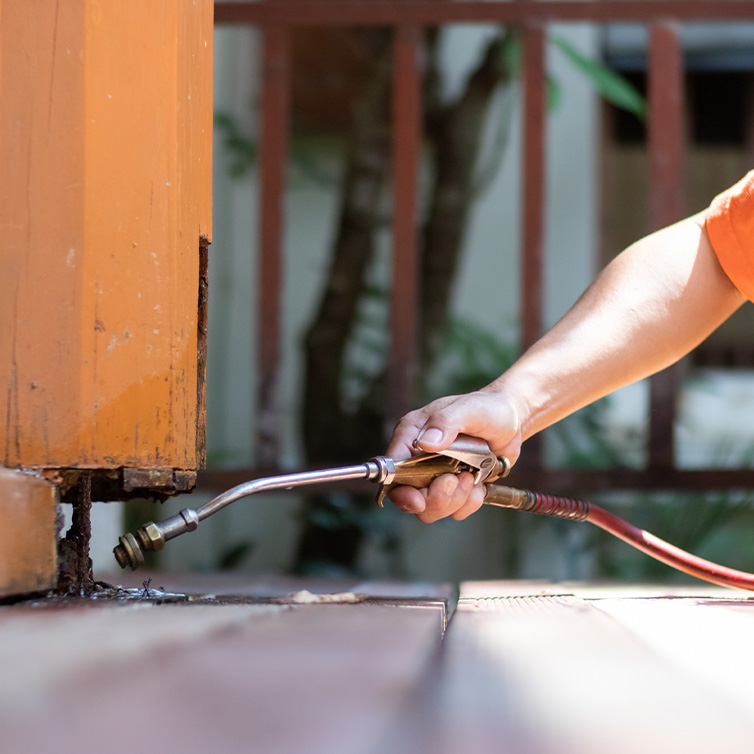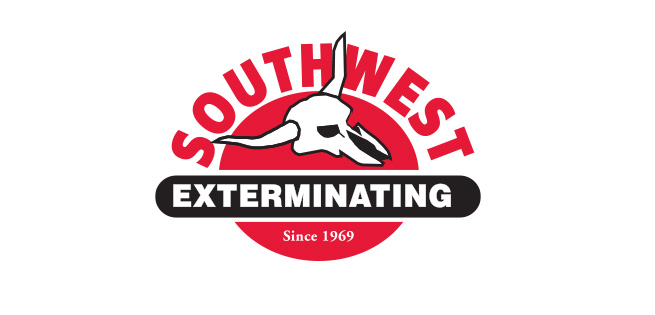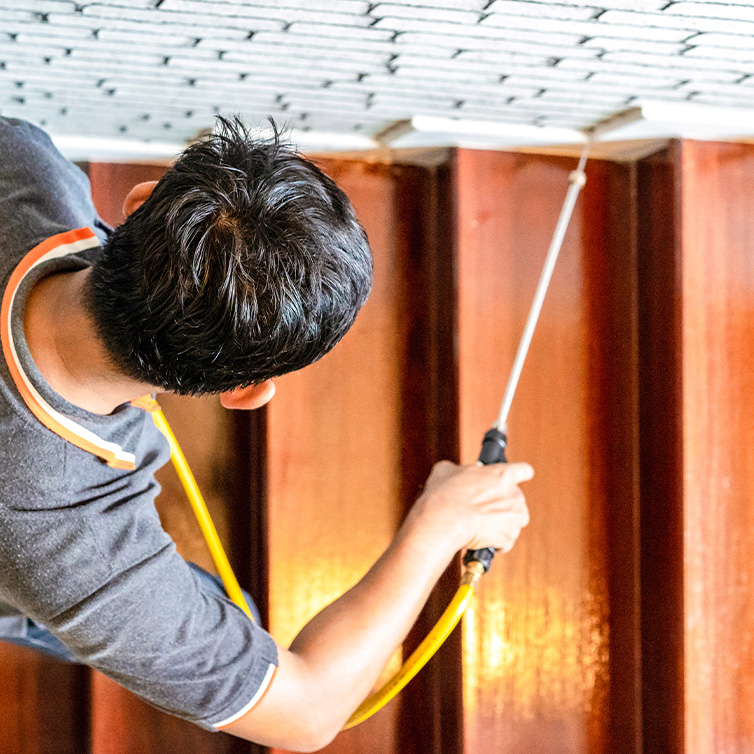
Houston Bee and Wasp Control
Safe Removal Strategies for Your Peace of Mind
Southwest Exterminating knows how to safeguard homes and businesses in the Greater Houston Area from unwelcome pests like bees and wasps. Since 1969, we’ve built a reputation for delivering reliable, science-driven control solutions designed to meet the specific needs of your property.
Our customer-first approach means you can trust us to use safe, environmentally responsible products that protect your family, pets, and property while still effectively addressing bees and wasps. We pride ourselves on responsive scheduling and efficient work, and emergency services are available.
Call us today at (281) 305-0637, or contact us online for professional bee removal.
Let Us Keep You Safe in Houston
When bees or wasps invade your property, you need professionals you can trust to handle the situation with efficiency and diligence. At Southwest Exterminating, we’re dedicated to delivering safe, effective solutions. We’re proud of the good reviews we’ve gotten from so many clients over our decades of service, and we welcome the chance to prove ourselves to you next.
Residents throughout Houston know that bee removal can be a sensitive and urgent matter, especially with our region's warm climate and long seasons that allow colonies to thrive. If you are noticing an increase in bee activity near your home or business, it’s important to address the problem quickly. Working with a bee removal Houston provider like Southwest Exterminating means you can rely on responsive technicians who understand local building codes and neighborhood requirements when performing safe and thorough removal. We are committed to keeping your family and property safe while minimizing disruption.
What Makes Us Different Why Choose Southwest Exterminating?
-
Quality Products & Solutions
-
Flexible Appointment Times
-
Customer Care Focused
-
Over 50 Years of Experience
The Signs of a Bee or Wasp Infestation
Detecting an infestation early can make a world of difference in managing bees and wasps. Here are some key signs to watch for in and around your property:
- Visible hives or nests: Look out for wasp nests shaped like paper cones or honeybee hives clustered in corners, trees, or under your eaves.
- Heavy buzzing sounds: Persistent buzzing noises near your wall voids, attics, or outdoor structures could indicate bee or wasp activity.
- Frequent flying activity: Bees and wasps flying in and out of a specific area on your property suggest a potential nesting site nearby.
- Stings or aggressive behavior: Increased aggression or stings may indicate that colonies are growing and becoming protective of their nests.
- Chewed wood or holes: Paper wasps sometimes chew wood fibers to build nests, and small holes in wood could indicate that they are gathering materials.
- Scattered dead bees or wasps: A higher presence of dead insects near windows, doorways, or light fixtures suggests a nearby infestation.
If you observe any of these signs or are unsure about a possible infestation, it may be time to speak with a wasp exterminator Houston residents trust for quick action and peace of mind. Our team is familiar with the unique challenges Houston-area properties face, including older homes found in neighborhoods close to Memorial Park or the Houston Heights, which often have hidden voids ideal for wasp nesting. Addressing infestations early keeps your family safe and prevents further property damage.
The Importance of Bees in the Ecosystem
Bees are vital to our lives, playing a key role in pollinating crops and native plants. It is estimated that over a third of the food we consume — from fruits and vegetables to nuts and seeds — relies on pollination.
Furthermore, bees contribute to the health of natural ecosystems. They maintain biodiversity by pollinating wildflowers and other plants, which in turn provide habitats and food for countless other species. This intricate balance highlights just how essential bees are to the environment and the interconnected systems that sustain our lives.
There are several ways bees directly impact both nature and daily life in Houston:
- Supporting local agriculture by pollinating crops grown throughout the Houston area and surrounding communities.
- Maintaining healthy gardens and landscaping, as pollinators help home landscapes flourish in our climate.
- Providing food for other species through pollinated plants, which contribute to robust local plant life and urban biodiversity.
At Southwest Exterminating, we recognize the importance of protecting bees while maintaining the safety and comfort of your property. That is why we prioritize humane removal methods, where possible, so bees can continue their critical work in the ecosystem — just not at the expense of your peace of mind and safety.
Through responsible bee and wasp control, we help preserve local biodiversity while still safeguarding the Greater Houston Area from the risks posed by active hives in residential and commercial areas.
Here’s how we help balance environmental responsibility and safety as a bee exterminator Houston property owners can count on:
- Eco-friendly removal practices that strive to relocate bees when possible instead of eliminating them outright.
- Careful assessment of each situation to determine the safest and least disruptive approach on your property.
- Ongoing education for our team to follow Houston-area guidelines regarding protected species and humane handling.
- Collaboration with local bee enthusiasts and organizations when relocation is needed, supporting pollinator health in our region.
By approaching wasp removal Houston property owners need with the same environmental awareness, we minimize harm to beneficial insects and reduce chemical use wherever possible. Our methods are designed for Houston’s unique climate and urban environment, combining effectiveness with community-minded care.
Call us today at (281) 305-0637, or contact us online for professional wasp control.
Why Professional Bee and Wasp Control Matters in Houston
Attempting to handle bee or wasp infestations on your own may seem appealing, but the risks can outweigh the benefits, especially in an area like Houston with its diverse neighborhoods and humid climate. Not only do different bee and wasp species require different removal strategies, but improper handling can also lead to structural damage or increased aggressive behavior from the insects. For this reason, homeowners and businesses often opt to call a bee control company Houston locals have come to trust for proper identification and safe management.
Houston’s climate encourages bees and wasps to build nests around roofs, attics, and other sheltered places protected from heavy summer rains. In many cases, nests may be hidden in areas with older construction or less routine inspection, making them difficult to spot before they become serious. In compliance with local building codes and safety ordinances, we ensure that all bee and wasp removal work is done safely and with long-term results in mind.
If you’re unsure whether to call a professional, consider these advantages of professional bee and wasp control services in Houston:
- Accurate identification of bee and wasp species for the most effective removal plan
- Safe removal techniques using equipment designed for Houston’s specific building materials and layouts
- Reduced allergy risks and minimized property damage due to fast, informed intervention
Frequently Asked Questions
Is it safe to try to remove a nest myself? No, it is very dangerous. Many bees in Houston are aggressive Africanized bees that attack in swarms when disturbed. Store-bought sprays often fail to reach the queen, provoking the colony. We have the professional protective gear needed to handle them safely.
Why do you remove the honeycomb, not just the bees? Leaving the honeycomb causes structural damage. Unattended honey melts, staining walls and rotting wood. Additionally, the smell attracts ants, roaches, and future bee swarms. We remove the entire hive to ensure the problem doesn't return.


